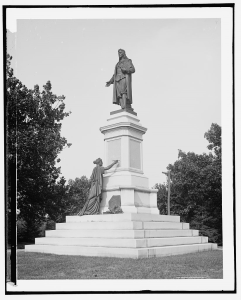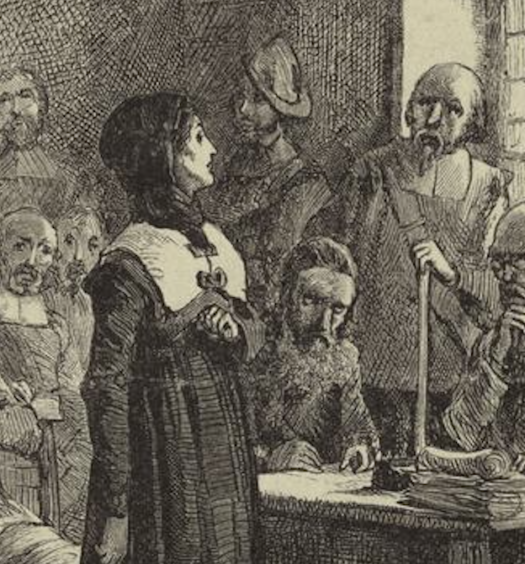Roger Williams stepped on the shores of New England for the first time in February of 1631. He had escaped from England, where English governmental authorities were attempting to eliminate all dissent from the established Church of England. Williams was a Christian minister who disagreed with the English ecclesiastical orthodoxy. He initially thought he could avoid attention by serving as a private chaplain at the rural estate of a Puritan family northeast of London, but the religious authorities in England were beginning to crack down even on private chaplains. So he left England in order to enjoy, he thought, religious freedom in America. Williams found upon his arrival in the New World, however, that the Puritan leaders were establishing a theocratic system in New England that was as harsh, if not harsher, than the Anglican theocracy he had left in England. These rulers accepted the premise of most seventeenth-century governments in Europe and America: that government should require everyone within its domain to conform to the doctrines and practices of an officially recognized church.
My recently published book, The First American Founder: Roger Williams and Freedom of Conscience, tells the dramatic story of the life, thought, and work of a man who refused to accept the conventional wisdom of his time and who forged a new way of thinking that came to characterize the best in the American tradition. Born and raised in England, Williams knew or otherwise personally encountered during his long life some of the greatest figures of English history: Sir Edward Coke, Sir Francis Bacon, King James I, the young man who became King Charles I, John Milton, Oliver Cromwell. In contrast to such famous contemporaries, Williams persistently argued, publicly and unambiguously, for complete liberty of conscience and what he called a “wall of Separation” between church and state—both for America and for Europe. At a time when most of the governments in Europe and America promulgated some form of established religion that persecuted religious dissenters, Williams founded a polity that was explicitly based on the principles and values of what became, more than 150 years later, the Establishment and Free Exercise Clauses of the First Amendment to the U.S. Constitution.
Within a few weeks after his arrival, the Massachusetts authorities were criticizing Williams for, among other things, teaching that government should not punish breaches of the First Table (religious laws) of the Ten Commandments. They later objected to his related position that the civil magistrate’s power extends only to the bodies and goods of people, not to their spiritual views, as well as to his arguments that the English king and colonists should not presume to dispose of the lands of Native Americans without their voluntary consent. The Massachusetts government strenuously opposed Williams’s views that English subjects should not be required to take loyalty oaths that included a religious component, that religious test oaths should not be required for voting or for political office, and that witnesses and jurors in judicial proceedings should not be required to take religious oaths. Williams’s positions on such matters resulted in his trial and banishment from the colony of Massachusetts Bay. After spending several weeks in the wilderness during the winter of 1636, Williams established a new settlement based on full liberty of conscience and complete separation of church and state. Consistent with his beliefs, he obtained the land for this new community by way of voluntary transactions with Native Americans. He named it Providence, and this town later became part of a larger colony and state that we know today as Rhode Island.
During the ensuing decades, Williams opposed the theocratic practices of the other New England colonies, including their banishment of religious dissenters, their imprisonment and whipping of Baptists, and their discrimination against and executions of Quakers. In return, the colonies of Massachusetts Bay, Plymouth, and Connecticut attempted, by political action in England and military action and internal subversion at home, to take over the lands belonging to the emerging Rhode Island colony and subject their inhabitants to Puritan religious orthodoxy. Although Williams obtained a charter from the English Parliament for his colony in 1644, this legal fact did not stop the imperialism of the other colonies. The Rhode Island colony eventually succeeded, however, in maintaining its territorial boundaries and independence from its acquisitive and theocratic neighbors. And, unlike the other New England colonies in the seventeenth century, it remained committed to liberty of conscience and church-state separation.
The historiography regarding Roger Williams has been quite curious. Until at least the late nineteenth century, “the reverend historians of the [New England] theocracy”—as Brooks Adams (the great-grandson of John Adams) called them—engaged in religious attacks on Williams, hating the very idea of freedom of conscience that he consistently supported. The pendulum then swung the other way, and Williams was praised by many late nineteenth- and early twentieth-century historians as being a votary of popular sovereignty, treating him, anachronistically, as a figure of the Enlightenment. In the middle and late twentieth century, many professional historians turned to an academic fad of considering Williams as a “man of his time,” conditioned by theological preconceptions that belonged to the seventeenth century but not acceptable to later centuries. Having earlier been condemned by theocratic historians for his advocacy of liberty of conscience, Williams now became an object of historicist condescension and belittlement.
The historical truth is that Williams himself advocated both secular and religious arguments for liberty of conscience and church-state separation. Although he was compelled by seventeenth-century publishing conventions to use theological arguments, he also argued, quite effectively, from reason and experience alone. In his most famous work, The Bloudy Tenent, of Persecution, for cause of Conscience (London, 1644), he explicitly presented the English Parliament “with Arguments from Religion, Reason, Experience . . . .”
It is often said that Williams was only concerned about the purity of the church and not about the protection of the state from religion. However, Williams argued in his Bloody Tenent Yet More Bloody (London, 1652) that “commixing (explicitly or implicitly) a spirituall and civill State together” results in “confounding and overthrowing the puritie and strength of both.” Such commingling of church and state, in his words, “corrupts and spoiles the very Civill Honestie and Naturall Conscience of a Nation” and is both “a Church-destroying and State-destroying Doctrine.” In Massachusetts Bay, according to Williams, “the Magistrate is but the Ministers Cane through which the Clergy speaks . . . .” James Madison made exactly the same argument more than 150 years later in a July 10, 1822 letter to Edward Livingston: “religion & Govt. will both exist in greater purity, the less they are mixed together.”
Many historians have alleged that Roger Williams had no influence on the American Founders who fought the Revolutionary War and established the Constitution and Bill of Rights. However, the historical truth is not so simple. Benjamin Franklin possessed two of Williams’s published works in his personal library. Thomas Jefferson and other contemporaneous Founders had copies of John Winthrop’s Journal in their libraries. Winthrop, the most famous governor of seventeenth-century Massachusetts Bay, was Williams’s longtime “frenemy.” Winthrop wrote extensively in his Journal about Williams’s history and commitment to liberty of conscience and church-state separation (principles with which Winthrop disagreed).
Moreover, Stephen Hopkins (an eighteenth-century Rhode Island colonial governor, revolutionary pamphleteer, and signer of the Declaration of Independence) published laudatory historical information about Roger Williams, as did Isaac Backus, a Baptist minister who supported the Constitution’s prohibition of religious tests for political office at the Massachusetts ratifying convention. Hopkins, Backus, and other Baptist and Quaker followers of Roger Williams met with John Adams, Samuel Adams, and other delegates to the First Continental Congress in the evening of October 14, 1774. They attempted, unsuccessfully, to persuade Massachusetts to stop persecuting Baptists, Quakers, and other religious dissenters.
John Leland, another Baptist minister who published favorable accounts of Roger Williams, was a strong influence on James Madison and probably was the one person most responsible for the election of Madison to the first Congress. It was in the House of Representatives of that Congress that Madison persuaded his colleagues, in the House and Senate, to adopt what became the First Amendment to the US Constitution and send it to the states for ratification. Leland also knew Thomas Jefferson. In fact, Leland may have even suggested Williams’s “wall of Separation” metaphor to President Thomas Jefferson on the very day that Jefferson wrote his famous letter to the Danbury Baptists using that figure of speech.
The commitment of Jefferson and Madison to freedom of conscience and separation of church and state is often said to be attributable to their study of the English philosopher John Locke’s Letter Concerning Toleration (1689). But Appendix D to The First American Founder establishes that Locke was very probably influenced, directly or indirectly, by the famous and politically consequential writings of Roger Williams published in London during Locke’s youth. Furthermore, Locke—in contrast to Williams, Jefferson, and Madison—opposed liberty of conscience for Roman Catholics and atheists. And Locke, like virtually all seventeenth-century writers (including the infidel Thomas Hobbes), used religious as well as secular arguments in support of his position.
Far from being merely a man of his time, Roger Williams has much to teach us across the centuries. Although he was not confronted with the complex First Amendment issues that have bedeviled the Supreme Court in recent decades, he clearly and repeatedly objected to any notion that any country could rightly call itself a “Christian nation.” At all times after his arrival in America, he consistently supported freedom of conscience and separation of church and state. Additionally, in both words and actions, he always tried to treat Native Americans fairly, and he made every effort, not always successfully, to prevent war between English settlers and the indigenous peoples.
[Banner: Image from cover of Alan E. Johnson’s book, The First American Founder: Roger Williams and Freedom of Conscience (Philosophia Publications, 2015)]
Alan E. Johnson, an independent scholar, is the author of the recently released The First American Founder: Roger Williams and Freedom of Conscience (Philosophia Publications, 2015) and other publications in the fields of history, constitutional law, political science, and philosophy. He is retired from a long career as an attorney in which he mainly focused on constitutional and public law litigation. The factual statements and quotations in the foregoing article are fully corroborated in The First American Founder.



















